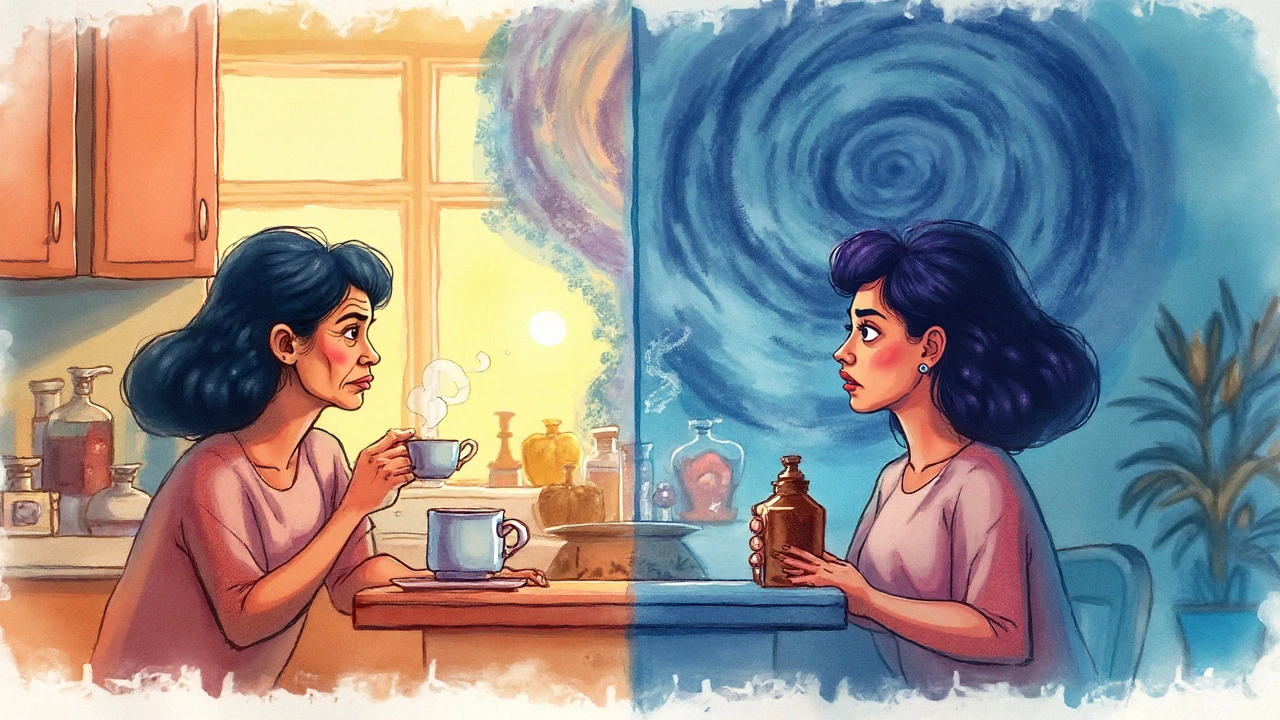Bepotastine Anxiety Risk Checker
Bepotastine is a second‑generation antihistamine that works as a H1‑receptor antagonist, primarily used to treat allergic conjunctivitis and allergic rhinitis. It was approved by the FDA in 2009 and is known for its rapid onset and low sedation risk.
Why the Question Matters
Every year, millions of people pick up an over‑the‑counter antihistamine to soothe itchy eyes or a runny nose. At the same time, anxiety disorders affect roughly one in six adults worldwide. When a patient reports a new jittery feeling after starting an antihistamine, clinicians and pharmacists wonder: is the drug to blame, or is it a coincidence?
How bepotastine Works in the Body
Understanding the possible link starts with the drug’s mechanism. Histamine is a signaling molecule released by mast cells during allergic reactions. It binds to H1 receptors in the eyes, nose, and airway smooth muscle, causing inflammation and itching. By blocking these receptors, bepotastine prevents the downstream cascade, delivering quick relief.
Unlike first‑generation antihistamines, bepotastine has limited ability to cross the blood‑brain barrier, the protective wall that keeps most large or polar substances out of the central nervous system. This reduced penetration is why the drug is marketed as “non‑sedating.” However, “non‑sedating” does not equal “non‑psychoactive”-even tiny amounts can interact with brain chemistry in susceptible individuals.
What Is Anxiety, Really?
From a clinical viewpoint, anxiety is a persistent state of heightened arousal, worry, or fear that interferes with daily functioning. Neurotransmitters such as serotonin, dopamine, and norepinephrine regulate mood and stress responses. Any drug that nudges these pathways-directly or indirectly-has the theoretical potential to tip the balance toward anxiety.
Biological Plausibility: Does Blocking H1 Matter?
Research on H1‑receptor antagonism and mood is sparse, but a few clues exist. Histamine itself acts as a neuromodulator in the brain, influencing wakefulness and alertness via H1 receptors in the hypothalamus. When you block peripheral H1 receptors with bepotastine, the brain’s histamine tone remains largely intact. The slight brain penetration that does occur could, however, antagonize central H1 receptors enough to alter sleep architecture, leading to fragmented sleep-a known trigger for anxiety.
Another angle involves the drug’s impact on cytochrome P450 enzymes. Bepotastine is metabolised primarily by CYP3A4. If a patient is already on a selective serotonin reuptake inhibitor (SSRI) that also uses this pathway, competition could raise plasma levels of one or both agents, potentially amplifying side‑effects such as jitteriness or panic attacks.

Clinical Evidence to Date
Randomised controlled trials (RCTs) for bepotastine focus on ocular and nasal outcomes, with safety endpoints limited to drowsiness, headache, and taste disturbance. A 2022 PhaseIII trial involving 1,102 participants reported a 0.8% incidence of “nervousness” in the bepotastine arm versus 0.3% in placebo-statistically non‑significant, but it flags a signal.
Post‑marketing surveillance databases, such as the FDA’s Adverse Event Reporting System (FAERS), contain roughly 150 reports linking bepotastine to anxiety‑related terms. Given the drug’s modest market share, this rate is still low, yet clinicians note a clustering of reports among patients with pre‑existing anxiety disorders.
In contrast, first‑generation antihistamines like diphenhydramine show a higher prevalence of both sedation and paradoxical agitation, especially in the elderly. This suggests that bepotastine’s design does indeed reduce central side‑effects, but it does not eliminate them entirely.
How It Stacks Up Against Other Antihistamines
| Drug | Generation | Blood‑Brain Barrier Penetration | Reported Anxiety Incidence | Typical Use |
|---|---|---|---|---|
| Bepotastine | Second | Low | 0.8% | Allergic conjunctivitis, rhinitis |
| Cetirizine | Second | Moderate | 1.2% | Seasonal allergies |
| Loratadine | Second | Low | 0.9% | Urticaria, allergic rhinitis |
| Diphenhydramine | First | High | 3.5% | Sleep aid, allergy relief |
The table shows that bepotastine sits near the low‑risk end of the spectrum. Cetirizine, while still second‑generation, has a marginally higher CNS penetration, which may explain its slightly higher anxiety reports. First‑generation agents clearly stand out as the biggest culprits.
Practical Takeaways for Patients and Clinicians
- Screen for baseline anxiety. Before prescribing an antihistamine, ask patients about any diagnosed anxiety disorder or frequent nervous feelings.
- Consider Loratadine or Fexofenadine if the patient has a history of anxiety, as their CNS penetration is among the lowest.
- If bepotastine is already in use and anxiety spikes, evaluate the timing. A gradual onset (days to weeks) may hint at a drug relationship, whereas sudden panic attacks often stem from external stressors.
- Check for drug‑drug interactions. Co‑administration with SSRIs, benzodiazepines, or other CYP3A4 substrates warrants dosage review.
- Document any side‑effects in the patient’s record and report them to national pharmacovigilance systems. Real‑world data help refine safety profiles.
Related Concepts and Next Steps
Exploring the bepotastine‑anxiety question opens doors to other topics worth reading next:
- The role of mast cells in neuroinflammation.
- How sleep hygiene interacts with antihistamine use.
- Understanding the pharmacogenomics of antihistamines in different ethnic groups.
- A deep dive into clinical trial design for side‑effect detection.
These areas broaden the picture of how seemingly benign allergy meds can influence mental health. As research evolves, staying informed helps both patients and providers make smarter choices.
Frequently Asked Questions
Can bepotastine cause anxiety?
Current evidence suggests a low but not negligible risk. Clinical trials report anxiety in less than 1% of users, while post‑marketing data hint at a slightly higher rate in people with pre‑existing anxiety disorders.
Why would an antihistamine affect mood?
Histamine is also a brain neurotransmitter. Even minimal crossing of the blood‑brain barrier can alter wakefulness, sleep quality, and stress hormone release, all of which can contribute to anxiety.
Is bepotastine safer than older antihistamines for anxious people?
Generally yes. Compared with first‑generation drugs like diphenhydramine, bepotastine has far lower central nervous system penetration and a markedly lower reported incidence of anxiety‑related side effects.
Should I switch to a different antihistamine if I feel jittery?
Talk to your pharmacist or doctor. They may suggest a switch to loratadine, fexofenadine, or a non‑antihistamine alternative such as nasal saline irrigation, especially if you have a known anxiety condition.
Do drug interactions increase the anxiety risk?
Yes. Bepotastine is metabolised by CYP3A4. Concurrent use of other CYP3A4 substrates-like certain SSRIs, antifungals, or calcium‑channel blockers-can raise its blood level and potentially amplify side‑effects, including nervousness.
How long does it take for anxiety symptoms to appear after starting bepotastine?
If a link exists, symptoms usually develop within a few days to two weeks, coinciding with steady-state drug concentrations. Sudden onset after many weeks is less likely to be drug‑related.
Should I report anxiety as a side effect?
Absolutely. Reporting to national pharmacovigilance programs helps regulators assess real‑world safety and can lead to updated prescribing guidance.


Mirian Ramirez
I started bepotastine last month for my seasonal allergies, and honestly? I thought I was just stressed. But after two weeks of being jittery at 3 a.m. and overthinking everything, I connected the dots. I didn’t even realize how much my anxiety had spiked until I stopped it. My doctor was skeptical at first, but when I showed him the timeline-he actually wrote it down. I’m switching to fexofenadine next week. If you’re feeling off after starting any new med, don’t brush it off. Your body’s trying to tell you something.